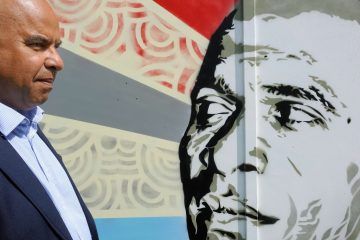 Bhakti Shringarpure in Africa is Not a Country:
Bhakti Shringarpure in Africa is Not a Country:
When Frantz Fanon was in late stages of leukemia at age 36, he was flown to a hospital in Bethesda, Maryland in the United States, for surgery. His five-year-old son, Olivier, walked in on an ongoing blood transfusion and, seeing the bags of blood, feared that his father had been cut into pieces. Little Olivier was later found waving an Algerian flag on the street since the brutal and ongoing Franco-Algerian war in which both his parents were deeply engaged was his only understanding of violence and blood in the world.
I was reminded of this heartbreaking story, included in David Macey’s Fanon biography, during the screening of Hassane Mezine’s film Fanon: Hier, Aujourd’hui (Fanon: Yesterday, Today), which features Olivier Fanon, now an adult, reading excerpts from his father’s work. Interviews with him add a particularly melancholic note to the beautifully composed summary of Fanon’s life comprising the “yesterday” portion of the film’s first half. “I was molded into the pro-independence scene of the Algerian war,” Olivier explains as he recounts living underground because of the constant threat to his father’s life.
Mezine encases Fanon’s story—a life lived defiantly for a short, energetic and prolific burst of time—between his beginnings as an 18-year old World War II soldier fighting against Nazism to his “ultimate fight against colonialism.” Here, the focus is on Fanon’s Algeria years, starting with his posting to Blida, where he was appointed chief doctor at the psychiatric hospital. Coming on the heels of the recently published Alienation and Freedom: Frantz Fanon, which has recuperated and translated almost two-thirds of Fanon’s work on psychiatry, the film also attempts to place Fanon’s psychiatric work at the center of his anti-colonial thought. It was in Blida where he was able to try out new, progressive methods in a place and moment where colonial, racist treatment of North African patients had become the norm.
More here.
